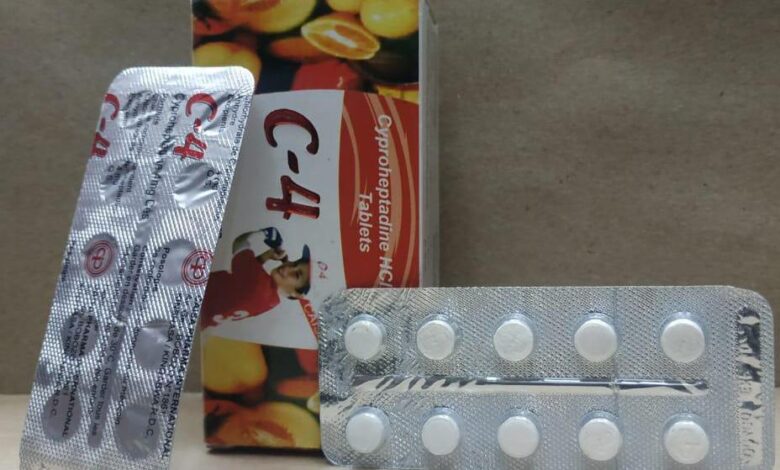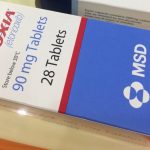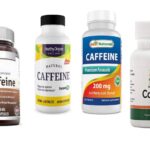C4 Pills: How it Works, Uses, Dosage, Side Effects, Interaction

What are C4 pills?
C4 pill is a brand of Cyproheptadine Hydrochloride that contains 4 mg of the active ingredient. Cyproheptadine is an antihistamine that reduces the effects of the natural chemical histamine in the body. Histamine can produce symptoms of sneezing, itching, watery eyes, and a runny nose.
C4 pills are used to treat sneezing, runny nose, itching, red or watery eyes, and other symptoms of seasonal allergies (hay fever). Cyproheptadine is also used to treat other conditions such as eczema or skin reactions to insect bites.
C4 pill is sometimes used to treat certain types of headaches, including migraines. In recent times, C4 pills have become widely used by weight gain enthusiasts for its appetite-stimulating and weight-boosting effects. C4 pill may also be used for purposes not listed in this medication guide.
What should I discuss with my healthcare provider before taking C4 pills?
You should not use C4 pills if you are allergic to it, or if:
- you have narrow-angle glaucoma;
- you have a stomach ulcer or obstruction;
- you have an enlarged prostate or urination problems;
- you are breast-feeding a baby;
- you are having an asthma attack; or
- you are elderly or have a debilitating disease.
Do not give this medicine to a newborn or premature baby. Cyproheptadine is not approved for use by anyone younger than 2 years old.
To make sure C4 pills is safe for you, tell your doctor if you have:
- glaucoma;
- a history of asthma;
- high blood pressure;
- heart disease; or
- an overactive thyroid.
C4 pill is not expected to be harmful to an unborn baby. Tell your doctor if you are pregnant or plan to become pregnant while using this medicine.
It is not known whether C4 pills passes into breast milk or if it could harm a nursing baby. Antihistamines may slow breast milk production. You should not breastfeed while using this medicine.
How should I take C4 pills?
The C4 pill comes as a tablet to take by mouth. It is usually taken two or three times a day. Take C4 pills at around the same time(s) every day. Follow the directions on your prescription label carefully, and ask your doctor or pharmacist to explain any part you do not understand. Take C4 pills exactly as directed. Do not take more or less of it or take it more often than prescribed by your doctor.
What happens if I overdose?
If you or someone you are with has an overdose, call your local emergency number (such as 911), or your local poison center can be reached directly by calling the national toll-free Poison Help hotline (1-800-222-1222) from anywhere in the United States.
Below are the symptoms of C4 pills overdose in different parts of the body.
Bladder And Kidneys
• Inability to urinate
• Difficulty urinating
Eyes, Ears, Nose, Mouth, And Throat
• Blurred vision
• Dilated (wide) pupils
• Dry mouth
• Ringing in the ears (tinnitus)
Heart And Blood Vessels
• Rapid heartbeat
• Increased blood pressure
Nervous System
• Agitation
• Coma (lack of responsiveness)
• Convulsions (seizures)
• Delirium (acute confusion)
• Disorientation, hallucinations
• Drowsiness
• Fever
• Irregular or rapid heartbeat
• Nervousness
• Tremor (shaking)
• Unsteadiness, weakness
Skin
• Flushed and dry skin
Stomach And Intestines
• Constipation
• Nausea and vomiting
What are the possible side effects of C4 pills?
Get emergency medical help if you have signs of an allergic reaction: hives; difficult breathing; swelling of your face, lips, tongue, or throat.
Stop using C4 pills and call your doctor at once if you have:
• a light-headed feeling, like you might pass out;
• tremor, seizure (convulsions);
• confusion, hallucinations;
• little or no urination;
• fast or pounding heartbeats;
• easy bruising or bleeding;
• ringing in your ears; or
• pale or yellowed skin, dark colored urine, fever, weakness.
Common side effects may include:
• drowsiness, dizziness;
• dry mouth, nose, or throat;
• constipation;
• blurred vision; or
• feeling restless or excited (especially in children).
This is not a complete list of side effects and others may occur. Call your doctor for medical advice about side effects. You may report side effects to FDA at 1-800-FDA-1088.
What other drugs can interact with C4 pills?
If your doctor has directed you to use this medication, your doctor or pharmacist may already be aware of any possible drug interactions and may be monitoring you for them. Do not start, stop, or change the dosage of any medicine before checking with your doctor, health care provider, or pharmacist first.
• Severe Interactions of C4 pills include:
o metyrapone
o selegiline
• Serious Interactions of C4 pills include:
o desvenlafaxine
o eluxadoline
o isocarboxazid
o phenelzine
o procarbazine
o sodium oxybate
o tranylcypromine
o Cyproheptadine has moderate interactions with at least 233 different drugs.
• Mild Interactions of C4 pills include:
o brimonidine
o eucalyptus
o nettle
o sage
o Siberian ginseng
This information does not contain all possible interactions or adverse effects. Therefore, before using this product, tell your doctor or pharmacist of all the products you use. Keep a list of all your medications with you, and share this information with your doctor and pharmacist. Check with your health care professional or doctor for additional medical advice, or if you have health questions, concerns, or for more information about this medicine.





